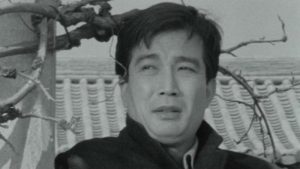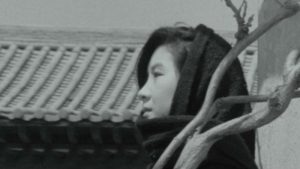The following quote from the late director Kim Ki-duk comes right at the start of this film, the last one he shot prior to his death from complications arising from COVID-19.
“The closer they are to death, the more humans miss and reminisce about their youth. I miss my twenties, although I made many mistakes in my youth. So, if I go back to that time, I really want to do good. But life never comes back.”
Kim wasn’t alive to complete it, so what we have here is the film put together from colleagues who worked with him. We’ll never know exactly how close the film is to what he intended, but it will have to do.
It was shot outside his native Korea – not the first time director Kim has done this: his second movie Wild Animals (1997) was shot in France, Amen (2011) in various parts of Europe and Stop (2015) in Japan. In recent years, various #metoo allegations against him by actresses have turned him into something of a persona non grata at home, and he’s been forced to work elsewhere. This final film was made in two Baltic States – Estonia and Lithuania – as well as Kyrgyzstan, with dialogue in Russian and Kyrgyz. The two lead actors could pass for Korean.
It takes place in the dreams of its young woman protagonist (Zhanel Sergazina), an idealistic romantic in search of / waiting for love to strike, when one day, a smart young man (Abylai Maratov) asks her the way to the Dream Café. It’s a sunny day and they walk in the park. Suddenly a thief snatches her purse, and the man sets off in pursuit, getting punched in the face but getting her bag back. After this, they start seeing one another. He turns out to be an author, so she buys his book. The next time they meet, it turns out he was going to give her a copy.
She initially resists his physical advances, but that doesn’t last long, and images soon get pretty racy. She starts talking about trust and accesses his mobile phone, whereupon she discovers that he’s still communicating with an old girlfriend and makes him swear he will speak to no other women from now on.
The black and white photography (i.e. most of the film) ostensibly represents a dream state, but that’s somewhat complicated by a parallel framing narrative in which, also in black and white, the woman periodically wakes from her dream and gets messages on her mobile phone (presumably the eponymous call of God) informing her that what occurred in her dream will soon recur in her waking life and advising that if she wants to see what happens next, she needs to go back to sleep. While you’re pondering what it all means, at the end of the film, it starts all over again, but this time in colour as what happened in her dream recurs in her waking life.
It’s bizarre that the film should play like a dream state when Kim himself would shortly pass into the next life – while you’re watching it there’s a definite sense of the hallucinatory, walking through parks, or later walking through nature, and the naive. In other parts, it throws the extraordinary at you, such as the scene where the couple feed each other tidbits on the end of sharp, pointed kitchen knife blades. And as elsewhere in the director’s films, there are characters who from time to time step outside the realm of the politically correct.
There’s something compelling about all this, to do with the very nature of cinema: sitting with a bunch of strangers in a darkened space for a group act of collective dreaming. For a while, Kim was the bad boy of Korean cinema, if not world cinema, going beyond the pale and doing things considered unacceptable. This film represents an intriguing coda to a fascinating if uneven career which refused to play by the rules.
Call Of God shows in the 26th Tallinn Black Nights Film Festival, as part of the Critics’ Picks strand.










